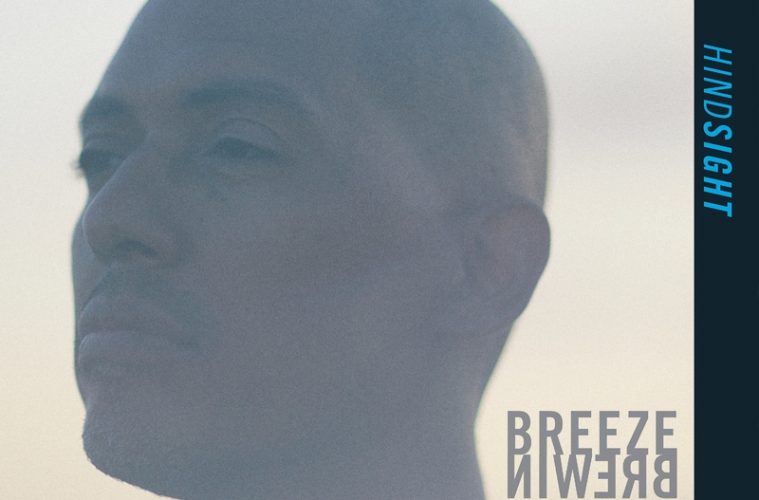It’s easy to sit back and analyze situations or events down to their very last atom long after they’re long behind us. Perhaps that’s why Breeze Brewin named the title of his solo album “Hindsight” and didn’t feel a need to include the now infamous number as its suffix. The Juggaknots emcee is known for his oft-monotone polysyllabic wordplay, narratives, and rhymes being both braggadocios (like his work as part of the Weathermen) or conceptual (like being the lead emcee on Prince Paul’s “A Prince Among Thieves”). Outside of his group work with his two siblings in the Juggaknots, I don’t believe I’ve ever heard Brewin himself spit raps about his life and the world around it. Combining the personal and the socially conscious, Brewin’s aim is true as he zeroes his scope in several shots, 13 in fact. Additionally, in having control over his own solo album, not only is Brewin the sole emcee, but he also handles production on 4 of the album’s 13 tracks.
“Hindsight” starts off with the Sebb Bash-produced “Gotta Love It”. This opening track has bouncy snares and many lines that are almost stream-of-consciousness “Be the man or see your fans call your bluff and…” and “Ball to you fall for real, I’m not kiddin / So applaud all of y’all that’s here and not quitin’”. Detroit’s own Black Milk makes an appearance on “The Uninvited” which sounds reminiscent of reversed guitars in addition to its DJ record scratching. Sebb Bash returns with his trademark bouncy sound on “Road Rage”. With the added element of honking horns and other motor vehicle sound effects, Breeze uses the concept of road rage as a metaphor for his anger and frustration. Though Breeze’s monotone voice may turn some listeners away, his lyrics are crafted with depth and cleverness. Take “Bumpy Johnson”. Produced by Breeze himself, the sound feels more grimey than the previous three. You’d think that the raps are about a crime story given the title, but it’s actually a clever flip on the name in how it’s a third person narrative about an “after school special”. Female vocals are all throughout the track:
Breeze’s manipulation of words and concepts continues on “PPT”, which he also produced. An acronym for “Pessimistic Personal Trainer”, the song rails against self-negativity. Over a head-nodding beat, Breeze uses wry metaphors of exercise and physiology to make his points against persistent self-doubt. DJ Maseo from De La Soul laces the beat on “Keep it Up”. It sounds upbeat and electronic as Breeze raps about a married couple losing the spice in their marriage, so they both cheat and it ends with a twist. “Taking Notes”, produced by Parallel Thought, is an intriguing track. Musically, it consists of dusty, live-sounding drums with a female vocal sample. The song is a first-person narration about being an educator. Breeze and his siblings are all teachers in their day jobs in the New York City public school system and he raps about the best and worst parts of being a middle school teacher. He talks about the poor diets of students, their unruly attitudes, and the hopelessness of fellow teachers in the teacher’s lounge. This intrigued me in part because several rappers who I’ve met and befriended in the last 5 years, rappers who are underground and/or unsigned, all have occupations in which they have some capacity in the field of education, as teachers or para-educators:
Not one to shy away from shit-talking rhymes, Breeze does exactly that on “Translate It” over B-Money’s heavy bass and metal-echoing snares. The tongue-twisting wordplay is in full effect on “King Oxymoron”, produced by Marco Polo. Breeze turns words on their heads with lines like “I record that real talk, but you probably won’t trust it” or “I’ma keep my opposites attractive / Ya’ll could sleep or ya’ll could get it active.” The DJ Spinna produced “Mentore” is similar to Masta Ace’s “Wanna Be” in that it’s a conversational rap track between old school and new school rappers. The pros and cons of both sides are on display: The progenitors seem stuck in the era of hip-hop’s inception and flourishing, while the younger generation are mostly ignorant to it all. The issue of age in hip-hop is heavily thematic here.
“Eye Poppa”, produced by Megalo, is built around a vintage R&B sample. Breeze raps about getting with a girl, having a crush, and what essentially goes on in a man’s head throughout all of that. The final two tracks to talk about were produced by Brewin himself: “The Application” is an extension of “Mentore”. A piano key-driven track, Breeze name-drops several rappers to educate someone who’s naïve about the getting into the rap game. It’s a crash-course in the rap business that ends with a walkout.
The album closer is “Devil’s Advocate”, which uses an interpolation of “Hail to the Chief” to lay a stinging indictment of Donald Trump and his presidency. In a sense, “Hindsight” really IS 2020. In Breeze’s case, it let him see his past and present with more clarity and provide the listener with such. Breeze’s day job is in the classroom, but on “Hindsight”, he’s both teacher and the bully. Though in the latter capacity, the only thing he’s provoking is the listener’s thoughts.

